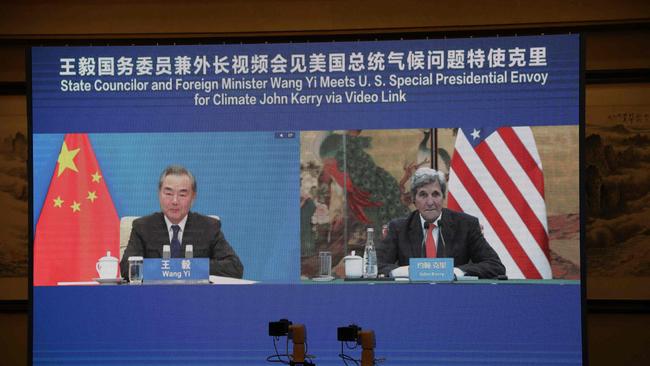Beijing blames US ‘strategic errors’ for superpower tension
The visiting US climate envoy John Kerry has been berated by China and told that hopes for co-operation were ‘unrealistic’.

Visiting US climate envoy John Kerry has been berated by China and told that America had made “a major strategic misjudgment” in its dealings with the country.
Hopes for co-operation on climate change measures were “unrealistic” and could not be divorced from the deteriorating relationship between the two superpowers, Foreign Minister Wang Yi said on Thursday.
China is the world’s largest emitter of carbon dioxide, with the US second. Together they produce 40 per cent of global greenhouse gas emissions.
Relations have chilled over a wide range of issues, including the origins of the pandemic, the militarisation of the South China Sea, China’s human rights record regarding its Uighur minority, the curb of freedoms in Hong Kong, the status of Taiwan, intellectual property theft and espionage.
“The US hopes that climate change will be the oasis in China-US relations. But if the oasis is surrounded by deserts, the oasis will later or sooner become sand,” Mr Wang said in a video call to Mr Kerry, who was in Tianjin, a northern port city, to meet his Chinese counterpart on climate change and to seek China’s co-operation. “The US should walk toward China, take active actions to return the bilateral relations to normal tracks.”
After the talks, Mr Kerry warned that Beijing’s coal-fired power station-building spree could “undo” global capacity to meet environmental targets.
He said the US has made it “clear that the addition of more coal plants represents a significant challenge to the efforts of the world to deal with the climate crisis”.
Chinese plans for new coal plants could “undo the capacity of the world to reach net-zero by 2050”, he said, adding that while they had “very constructive” talks he was also “very direct” on the topic.
Despite pledges to peak coal consumption before 2030, China brought 38.4 gigawatts of new coal-fired power into operation last year – more than three times that brought on line globally.
Analysts have said that without agreement on significant carbon emission curbs involving the two powers, nothing meaningful could hope to be achieved at the Cop26 climate conference in Glasgow in November.
President Joe Biden has said he wants to work with China on areas of common interest. Mr Wang said it was up to the US to try to reset relations. “In recent years relations have taken a nosedive and now face serious difficulties. The root cause is that the US has made a major strategic misjudgment about China,” he said. “The US should stop seeing China as a threat and an adversary, stop containing China around the world, but respond to (our demands) and take concrete acts to improve China-US relations.”
Beijing has demanded that Washington not challenge its political system and not obstruct its economic growth, nor violate its sovereignty and territorial integrity, including its claims in the South China Sea and Taiwan.
Yang Jiechi, a member of the political bureau, also told Kerry via video link that Washington had taken “a series of wrong acts” that interfered with China’s internal affairs and harmed its interests. “China is firmly against these acts, and takes firmer acts to respond,” he said.
China announced new rules on Wednesday ordering certain foreign ships, including submarines, nuclear-powered vessels and those carrying toxic materials, to report their presence when entering its territorial waters, a move aimed at cementing its maritime claims in the disputed South China Sea, through which trade valued at $US7.1 trillion passes each year.
Foreign military vessels were already under orders to seek permission before entering China’s territorial waters, which extend up to 12 nautical miles from its coasts, including islands. Beijing now claims all of the sea, despite overlapping claims by several neighbouring nations including Vietnam, The Philippines and Indonesia. The US and its allies insist that it is an international waterway and frequently sail navy vessels into the area to assert those rights.
Relations with the self-governing island of Taiwan have soured dramatically, with China now routinely sending warplanes to test its defences and carrying out military exercises simulating amphibious landings. China has vowed to take back the island, by force if necessary, to achieve national unity.
Taiwan said on Thursday that it was establishing a new government department called the All-out Defence Mobilisation Agency, with a brief to improve the combat readiness of its reserve forces and “to comprehensively utilise the powers of the entire nation, in order to support military actions and disaster prevention and relief tasks”.
Members of the new agency will be sent for training in the US, which has a security pact with Taiwan to supply it with sufficient hardware and technology to deter any invasion – long a bone of contention in Beijing.
The Times



To join the conversation, please log in. Don't have an account? Register
Join the conversation, you are commenting as Logout